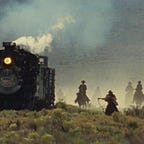Table of Contents for February 2024
February felt long in a way a Leap Year can’t quite explain. Migraines in a work-induced bluescreen fog tell some of the story.
Early in the month, or maybe it was all the way back in January, I managed to see American Fiction on the big screen. Since then, I’ve scratched out time to see in fragmented viewings during lunchbreaks and after bedtimes Anatomy of a Fall, Maestro, and The Holdovers.
There’s always a plan to write more about all these things I’m scratching out of a workday when I’m supposed to be highly focused on construction management proposals and using Procore. Personal schemes trapped inside professional schemes, I do wonder how Wile E. Coyote afforded all those ACME products, and Wile E. Coyote played a big part of my February.
On February 11, I submitted Coyote v. Deletion to a handful of humor sites, a few of which have previously published some hairbrained joke of mine in some prior year. But no takers on this property belonging more to Warner Brothers than me or the general public.
To write Coyote v. Deletion, I spent an afternoon watching old Looney Tunes episodes with my daughters. They didn’t know the Roadrunner — and who ever really does know the Roadrunner? And they didn’t know Wile E. Coyote either, although when they have asked me to tell them stories out loud I have sometimes borrowed from Coyote’s hunting schemes as a jumping off point.
They found these animated operas rather hilarious, and they also found delight in correcting Wile E. Coyote’s opinion of himself. “I’m not sure he’s a genius,” they would say, and they very well might be right.
And here’s why Warner Brothers seems to have walked off a cliff in my mind. They cancelled, or deleted, the film Coyote v. ACME, which was pretty much finished and ready for release at any time. The movie was based off the humor piece by Ian Frazier, which debuted in The New Yorker and has been featured in high school literature textbooks over the last twenty years. The movie was described as following in the vein of Who Framed Roger Rabbit? and appeared to pack a satirical underbite in its sense of wild bemusement and likely slapstick sense of humor. There was clear nostalgia here, but also a generative sense of fun. See the clip below of a choir belting Meeps.
And the fact that all this potential fun that would have crisscrossed the desert spaces between generations was swallowed up not solely by Warner Brothers’ bottom line but also by a lack of belief in their own creative properties is the biggest defeat ever dealt to Wile E. Coyote, who in the world of Looney Tunes always tries again, and in the world of Ian Frazier finally turns tail and pursues his real rival, ACME, in the courts.
A few years ago, Warner Brothers released Space Jam: A New Legacy with LeBron James as the center piece next to Bugs Bunny. The film made over $163.6 million worldwide (over $70.5 of which was in domestic dollars), but the original Space Jam with Michael Jordan cleared over $230 million. I can’t help thinking that Coyote v. ACME didn’t fail on its own but because Space Jam: A New Legacy failed to get out from under Michael Jordan’s Nike silhouette.
And the real shame here is that the leadership at Warner Brothers can’t see the difference in how Space Jam: A New Legacy engages with nostalgia and how Coyote v. ACME likely engages with nostalgia. One tries to serve up leftovers where the other attempts to utilize the leftovers as ingredients. The difference is subtle, but isn’t what separates a genius coyote from all the other coyotes a bit more subtle and nuanced than an ACME anvil?
In American Fiction, an author played by Jeffrey Wright trades in his attempts at genius for popularity and a fat advance. In other words, to pay for his mother’s medical bills he cashes in on shame and sadness, as does the film, which drastically softened via pink rubber shavings the near bitter tones and caustic undercurrents of Percival Everett’s novel Erasure.
In Anatomy of a Fall, a writer and husband who could not catch his roadrunner either leaps from a high window or is pushed by his wife and author, but either way, the man’s inability to deal with failure in the light of a woman’s successes is the catalyst for a desperate act upon which an entire film’s investigations of the human spirit and its relation to art and family revolves. I am still contemplating the ending and the character choices that made it possible.
In Maestro, a similar marriage to that of the one in Anatomy of a Fall unfolds, and the creative spirit and its appetites are at war with order and decorum — to perform on one stage requires a performance on all other stages. How do we keep our promises to each other and ourselves?
And, in The Holdovers, a teacher who is afraid to write or be out in the world has essentially deleted himself during his tenure at the prestigious Barton Academy, but that’s not the end of the story. There is a daringness to escape the snares and predicaments. To be in pursuit of any yet to be named dream is a drive into liberation.
Coyotes the world over, except at Warner Brothers. Or maybe there too, just not on the screen.
February
“Wile E. Coyote v. Deletion” (February 19)
“What I’m reading from in February” (February 13)
“Amy Roa’s poetry book Radioactive Wolves” (February 8)
“Airport Beers with Justin Bryant’s novel Thunder from a Clear Blue Sky” (February 6)
“TOC for January 2024” (February 5)
